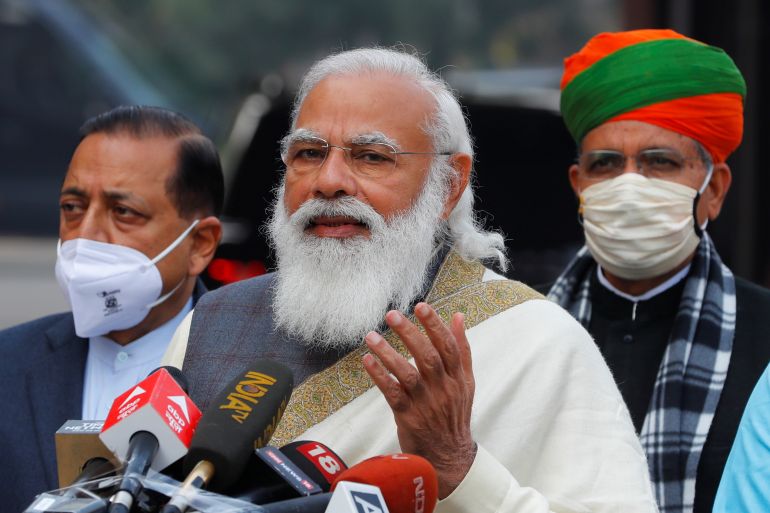India’s Modi breaks silence on months-long farm law protests
India will push on with sweeping agriculture reform, Prime Minister Narendra Modi says as he criticises last week’s deadly violence.

India’s Prime Minister Narendra Modi has said the protesters that stormed New Delhi’s Red Fort last week caused “insult” to the country and that his government will push on with sweeping agriculture reform, his first public comments on a months-long farmers’ agitation.
“The country was saddened by the insult to the Tricolour [Indian flag] on the 26th of January in Delhi,” Modi said in a radio address on Sunday.
Keep reading
list of 4 itemsIndia’s Haryana state blocks internet amid farmer protest clashes
India budget 2021: Can the government help consumers spend more?
More Indian-made COVID vaccines will be released: Modi
“The government is committed to modernising agriculture and is also taking many steps in that direction.”
Tens of thousands of farmers have camped on the outskirts of the capital for more than two months, protesting new agricultural laws they say benefit private buyers at the expense of growers.
A tractor parade on Tuesday’s Republic Day turned violent when some protesters deviated from predetermined routes, clashing with police and breaking into the historic Red Fort complex in the capital.
The demonstrators swarmed the 400-year-old World Heritage-listed fort, raising religious and farm union flags, though they did not remove the national flag from the top of the monument.
One protester died and hundreds, including policemen, were injured in the clashes.
Farm leaders say they were not responsible for violence, that it was caused by a minority of those on the parade, and that they will resume their talks with the government.
Modi told opposition party leaders on Saturday an offer to freeze the laws for 18 months still stands, according to a government summary of the meeting.
Agriculture employs about half of India’s labour force, and unrest among an estimated 150 million land-owning farmers is one of the biggest challenges to Modi’s rule since he first came to power in 2014.
Targeting journalists
Modi’s comments came as police arrested at least one journalist and filed complaints against others, stoking fears of a media crackdown over the reporting of the protests.
Mandeep Punia, who writes for the English-language Caravan magazine, was detained on Saturday at Singhu, one of the main protest sites.
He was photographed being taken to court on Sunday, where he is expected to be charged on unknown offences, local media reported.
Since Tuesday, at least five complaints have been registered against Indian journalists and an opposition Congress member of parliament on several allegations, including sedition and criminal conspiracy.
Global media watchdog the Committee to Protect Journalists (CPJ) called for Punia and another journalist who was reportedly also detained to be released immediately.
“Indian authorities should allow journalists to do their work without interference,” the CPJ tweeted late on Saturday.